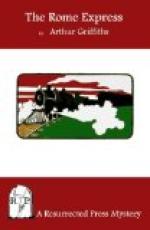“Countess. Remember. Silence—absolute silence. Not a word as to who I am, or what is common knowledge to us both. It is done. That cannot be undone. Be brave, resolute; admit nothing. Stick to it that you know nothing, heard nothing. Deny that you knew him, or me. Swear you slept soundly the night through, make some excuse, say you were drugged, anything, only be on your guard, and say nothing about me. I warn you. Leave me alone. Or—but your interests are my interests; we must stand or fall together. Afterwards I will meet you—I must meet you somewhere. If we miss at the station front, write to me Poste Restante, Grand Hotel, and give me an address. This is imperative. Once more, silence and discretion.”
This ended the writing in the note-book, and the whole perusal occupied Sir Charles from fifteen to twenty minutes, during which the French officials watched his face closely, and his friend Colonel Papillon anxiously.
But the General’s mask was impenetrable, and at the end of his reading he turned back to read and re-read many pages, holding the book to the light, and seeming to examine the contents very curiously.
“Well?” said the Judge at last, when he met the General’s eye.
“Do you lay great store by this evidence?” asked the General in a calm, dispassionate voice.
“Is it not natural that we should? Is it not strongly, conclusively incriminating?”
“It would be so, of course, if it were to be depended upon. But as to that I have my doubts, and grave doubts.”
“Bah!” interposed the detective; “that is mere conjecture, mere assertion. Why should not the book be believed? It is perfectly genuine—”
“Wait, sir,” said the General, raising his hand. “Have you not noticed—surely it cannot have escaped so astute a police functionary—that the entries are not all in the same handwriting?”
“What! Oh, that is too absurd!” cried both the officials in a breath.
They saw at once that if this discovery were admitted to be an absolute fact, the whole drift of their conclusions must be changed.
“Examine the book for yourselves. To my mind it is perfectly clear and beyond all question,” insisted Sir Charles. “I am quite positive that the last pages were written by a different hand from the first.”
CHAPTER XIX
For several minutes both the Judge and the detective pored over the note-book, examining page after page, shaking their heads, and declining to accept the evidence of their eyes.
“I cannot see it,” said the Judge at last; adding reluctantly, “No doubt there is a difference, but it is to be explained.”
“Quite so,” put in M. Flocon. “When he wrote the early part, he was calm and collected; the last entries, so straggling, so ragged, and so badly written, were made when he was fresh from the crime, excited, upset, little master of himself. Naturally he would use a different hand.”




